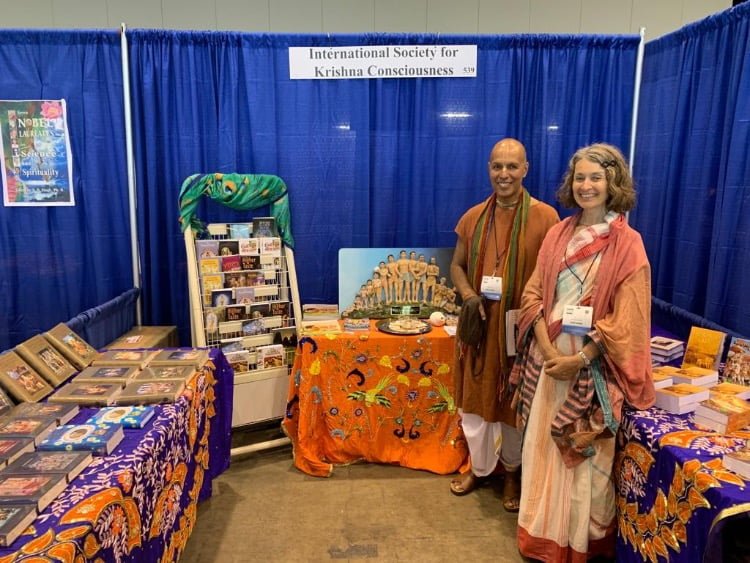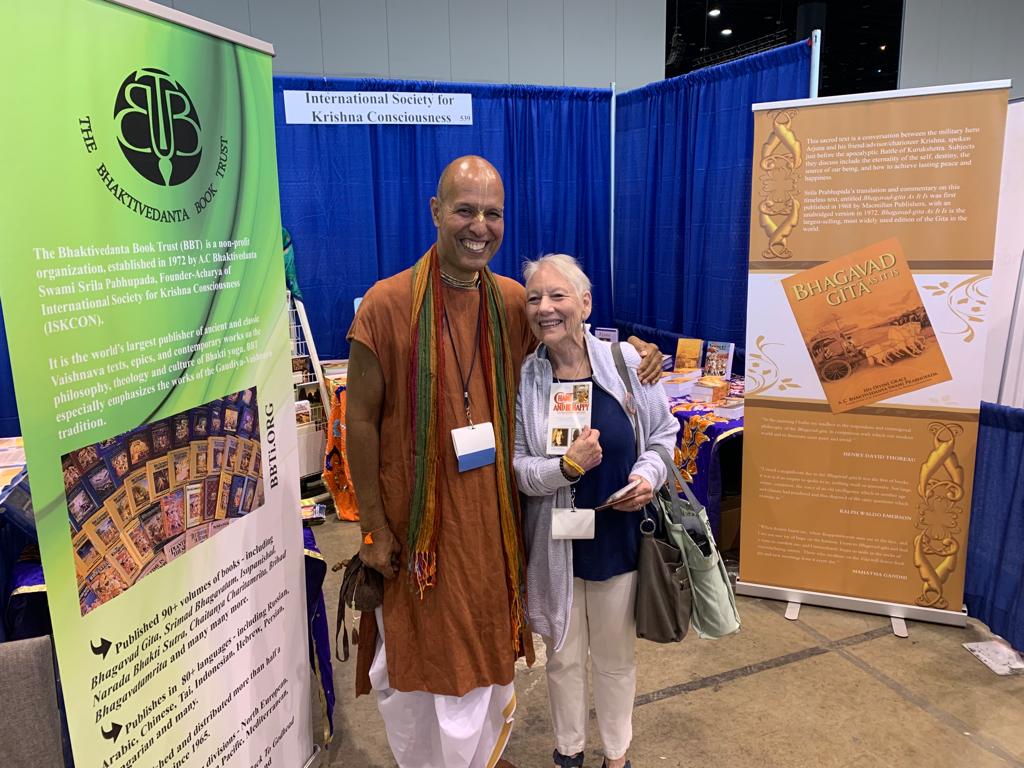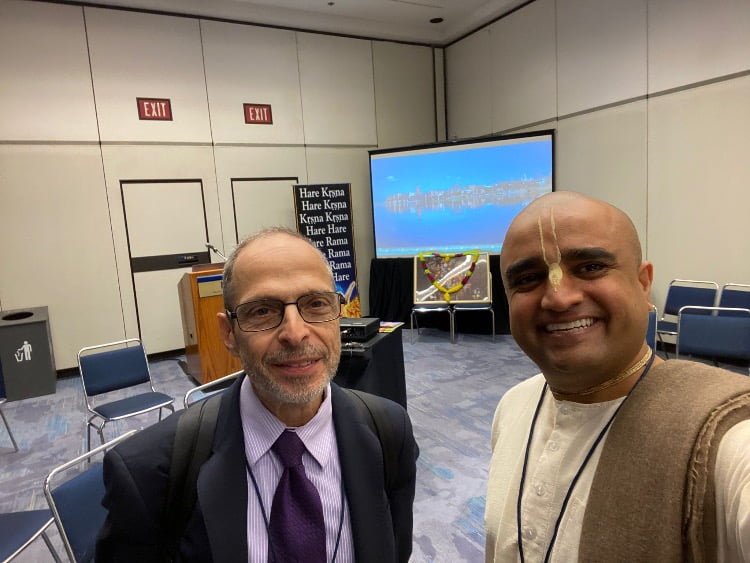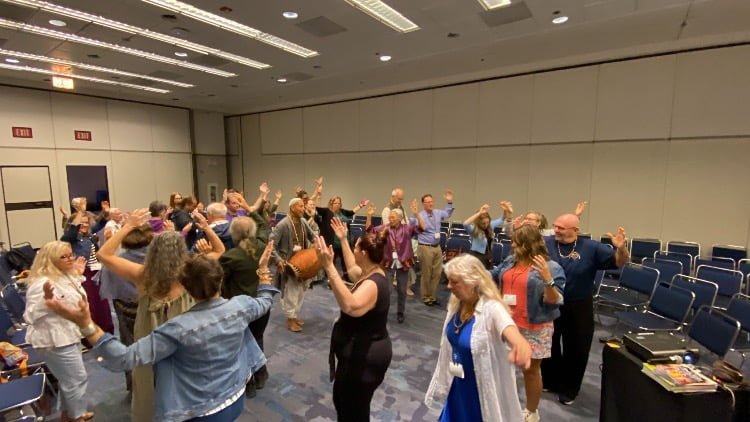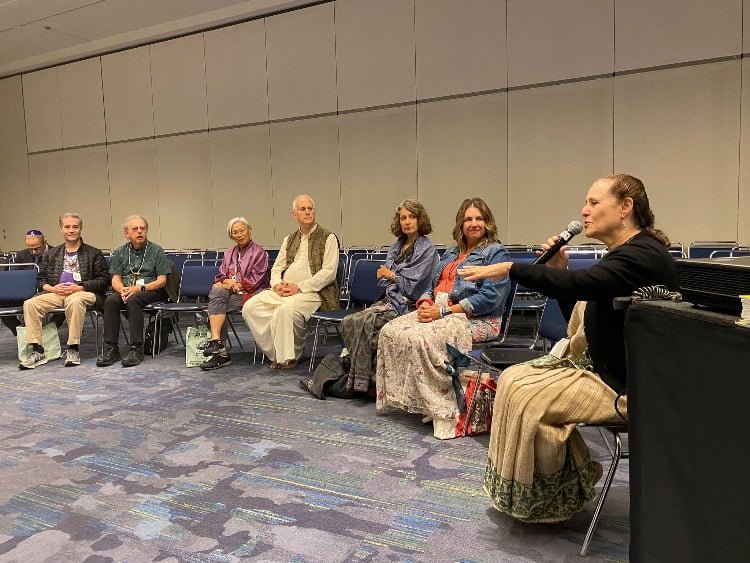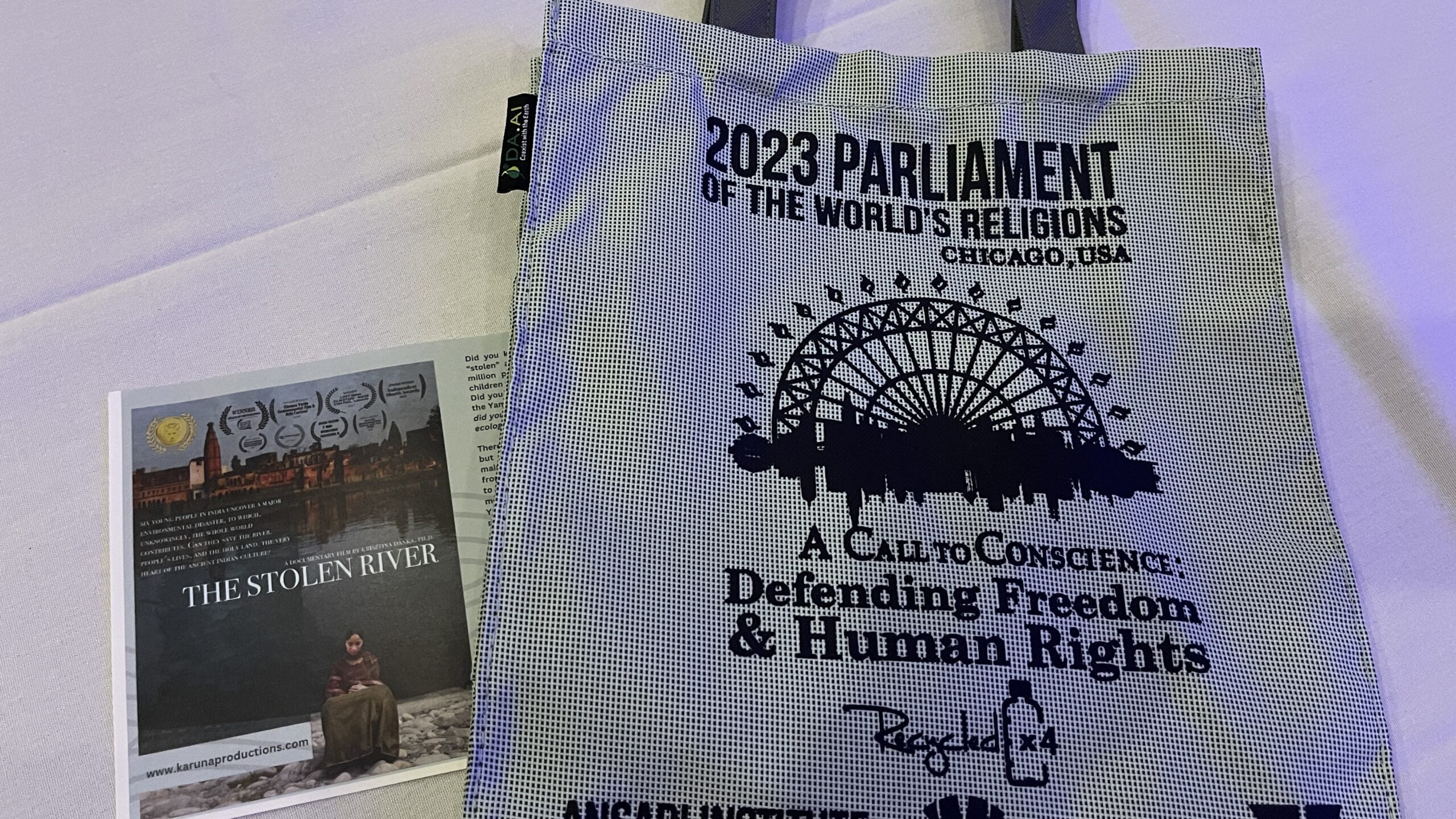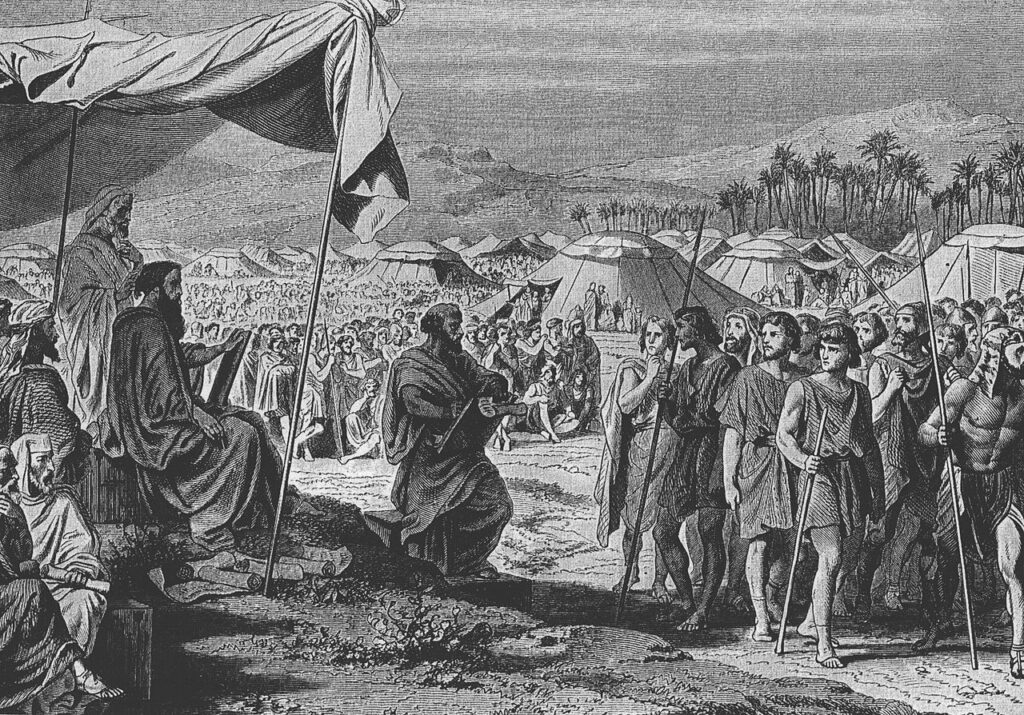ISKCON Leaders Brought Valuable Perspectives to 2023 Parliament of the World Religions Conference
By Thomas Haribol, ISKCON News Managing Editor | Aug 22, 2023
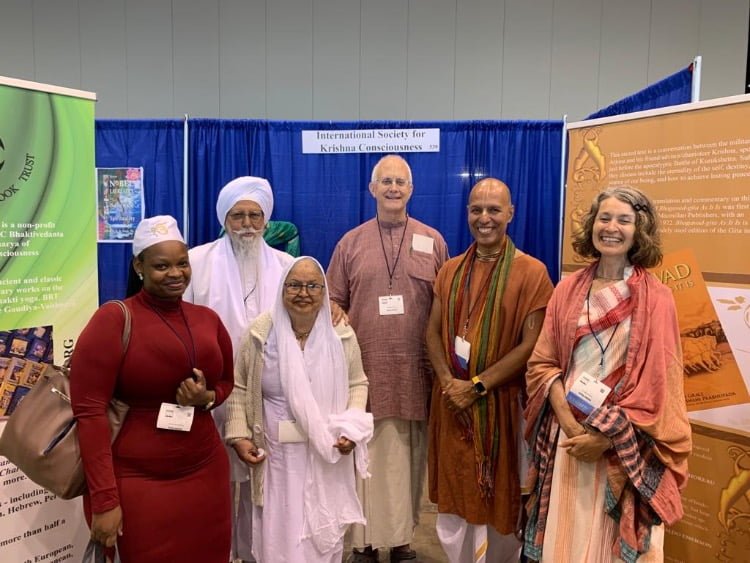
Sikh member Ajit Ahuja, with his wife and friend visiting the ISKCON booth with Anuttama Dasa, Subal Dasa and his wife Krsnarcana Dasi from ISKCON Chicago.
Last week, the Parliament of the World’s Religions (PoWR) gathered thousands of people of faith, spirituality, and ethical convictions to Chicago, USA, for their 2023 convention. This year’s theme was “A Call to Conscience: Defending Freedom & Human Rights.” The historic gathering welcomed participants from around the world to the emblematic city where the first Parliament was held 130 years ago.
It is one of the world’s largest inter-faith gatherings, with 6,500 participating this year, and was held at the massive McCormick Place Conference Center August 14-18th. The festivities were inaugurated by an energetic and colorful Parade of Faith on August 13th.
ISKCON leaders actively participated in the multi-day gathering, which included plenary presentations from “luminaries,” interactive programs, and spiritual performances, all focused on the themes of peace, justice, and sustainability within interfaith movements worldwide. “Overall, the conference promoted a deeper sense of the importance of religion and spirituality across all human communities, heightened awareness of the need for better understanding between religious and spiritual communities, and increased cooperation in facing the problems that humankind is faced with today,” said Anuttama Dasa, Global Minister of Communications for ISKCON.
ISKCON Chicago, the Bhaktivedanta Institute, and the Govardhan EcoVillage each had engaging booths at the event, welcoming hundreds of participants. The ISKCON Chicago booth included plentiful spiritual literature, an altar, and a large beautiful copy of Srila Prabhupada’s Bhagavad Gita As It Is.
- Subal Dasa and his wife Krsnarcana Dasi from ISKCON Chicago.
- Subal Dasa with parliament participant Bonnie from Virginia.
In addition to their booth, the Govardhan EcoVillage team, led by its Director, Gauranga Das, conducted two seminars on their community’s significant environmental and spiritual work.
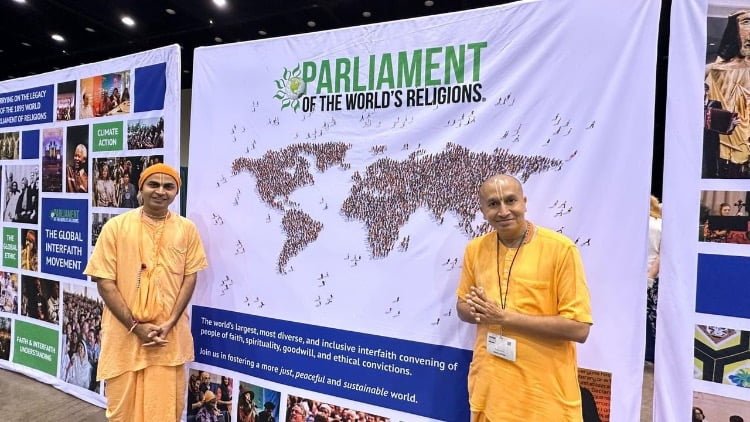 Navina Krishna Das and Gauranga Das at PoWR.
Navina Krishna Das and Gauranga Das at PoWR.
Madana-Gopala Dasa, North American Co-Director of ISKCON Communications, shared on the importance of chanting the Holy Names of God and led a collective round of japa for about 30 participants. “We also had two kirtan and dance sessions during this service. It was about a 1.5-hour program,” said Madana-Gopala. Anuttama Dasa and Rukmini Devi Dasi then facilitated a lively Q&A session. Additionally, there were readings shared from the Bhagavat Purana.
- UK Rabbi Jeff Berger and Madana-gopāla Dāsa.
- One of the kirtan sessions with participants.
- Rukmini answering participant questions.
Herbalist Ashley Elenbaas and Rukmini Walker, foundress of urbandevi.com led an interactive workshop called “Opening the Inner Heart Space, Linking Nature’s Voice, Divinity, and Human Intuition.” Among the many participants were a female rabbi, a Catholic priest, and a female minister from Unity Church.
- Ashley Elenbaas and Rukmini Walker.
- Opening the Inner Heart Space workshop.
Anuttama, Madana-Gopala, and Gopala Hari Dasa (Dr. Gopal Gupta) co-led a presentation on the Hindu response to the global climate crisis. Anuttama, who is also a member of Religions for Peace USA, and the Elijah Interfaith Institute, also participated in several side events promoting understanding and cooperation between religious leaders. “One session of interest explored the challenges faced by minorities in many South Asian countries,” noted Anuttama, “The need was highlighted for all of those groups and the majority to be more conscious of the collective trauma of South Asian history, especially from colonization, and how that has impacted and heightened tensions between the different religious and ethnic groups in that region.”
This year also included a Film Festival which held a special screening of “The Stolen River,” the award-winning documentary by director Dr. Kristina Danka (Krishna Lila Devi Dasi) from Karuna Productions which tells the journey of six young people from Braj discovering the causes of the Yamuna’s pollution and their efforts to save the sacred river.
In the audience, there were several clean water advocates of global recognition, including Grove Harris, the UN representative of the Interfaith Collaboration for a Sustainable Future, who publicly expressed her great appreciation for the film in the next day’s “Sacred Water in a Climate Changed Era” symposium.
“Following the screening and the symposium, spiritual people from all over the world and various religions expressed their great concern for the Yamuna River,” said Director Krishna Lila, “They offered their help in spreading the word and creating awareness.” The Stolen River is available for streaming here.
“The last night was a celebration of sacred music in the plenary hall. Devotees from ISKCON Naperville led a kirtan with several hundred people in the audience,” Anuttama remarked, “Many of them danced and chanted with the devotees.”
While appreciating their differences, each community of faith at this year’s conference could also celebrate the common ground shared. According to Phyllis Curott, the Program Chair of the 2023 Parliament of the World’s Religions, “Every faith has, at its core, a summoning to ease the suffering of others and to contribute to a just, peaceful, and sustainable world…to stand together in defense of the dignity, freedom, and human rights of all.”
A special thanks to Anuttama Dasa, Gauranga Das, Rukmini Walker, Madana-Gopala Dasa, Subal Dasa, Ashley Elenbaas, and Krishna Lila Devi Dasi for the use of photos.
